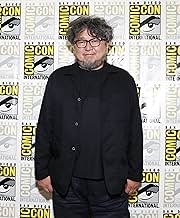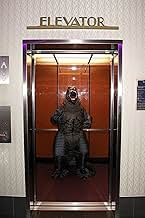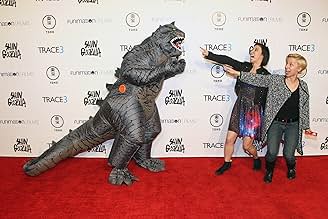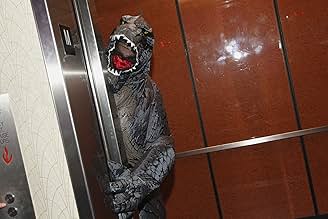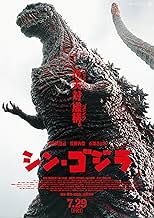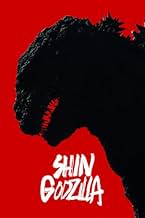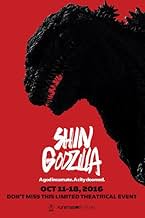Após um acidente na baía de Tóquio, uma criatura gigante chamada Godzilla aterroriza todo o Japão.Após um acidente na baía de Tóquio, uma criatura gigante chamada Godzilla aterroriza todo o Japão.Após um acidente na baía de Tóquio, uma criatura gigante chamada Godzilla aterroriza todo o Japão.
- Direção
- Roteiristas
- Artistas
- Prêmios
- 13 vitórias e 10 indicações no total
- Direção
- Roteiristas
- Elenco e equipe completos
- Produção, bilheteria e muito mais no IMDbPro
Avaliações em destaque
If you are expecting a stereotypical monster movie you will be disappointed. This film is definitely much more of a political thriller than a monster flick.
The movie is filled with plain and mostly forgettable characters, however, collectively they make the real protagonist of the film: Japan. The film critiques and parodies a dysfunctional bureaucracy, allowing for some not so subtle irony and other comedic moments using techniques such as extreme close-ups, quick changes in POV's, rapid-fire dialogue to reinforce these while still allowing for suspense when needed. Its overly fast pace is a bit jarring at times, making it hard to concentrate with its many fast and transitionless cuts.
Shin Godzilla feels very much like a documentary, with convincing this-is-really-happening atmosphere. The filmmakers really make you feel like a participant and witness to the events happening throughout the film engrossing you into the universe and adding a huge sense of realism which adds to the political side of the film and the impact of the destruction.
Godzilla himself is also amazing, the combination of puppeteering, animatronics and digital effects create such a unique portrayal of the monster evoking terror and intrigue. Though, the cgi isn't always perfect, but this can be overlooked.
The ending is also a mixed bag, it has a great message of collaboration and ends with an interesting introspection on who the bigger monster is: humanity or Godzilla. However it did feel too cheap and easy which kinda diminished the realistic tone set by the film.
The movie is definitely not perfect but its multi layered symbolism and message are so interesting I couldn't help but be invested throughout the whole thing.
The movie is filled with plain and mostly forgettable characters, however, collectively they make the real protagonist of the film: Japan. The film critiques and parodies a dysfunctional bureaucracy, allowing for some not so subtle irony and other comedic moments using techniques such as extreme close-ups, quick changes in POV's, rapid-fire dialogue to reinforce these while still allowing for suspense when needed. Its overly fast pace is a bit jarring at times, making it hard to concentrate with its many fast and transitionless cuts.
Shin Godzilla feels very much like a documentary, with convincing this-is-really-happening atmosphere. The filmmakers really make you feel like a participant and witness to the events happening throughout the film engrossing you into the universe and adding a huge sense of realism which adds to the political side of the film and the impact of the destruction.
Godzilla himself is also amazing, the combination of puppeteering, animatronics and digital effects create such a unique portrayal of the monster evoking terror and intrigue. Though, the cgi isn't always perfect, but this can be overlooked.
The ending is also a mixed bag, it has a great message of collaboration and ends with an interesting introspection on who the bigger monster is: humanity or Godzilla. However it did feel too cheap and easy which kinda diminished the realistic tone set by the film.
The movie is definitely not perfect but its multi layered symbolism and message are so interesting I couldn't help but be invested throughout the whole thing.
This is an excellent show that differs from the standard hack-and- slash and action-driven natures of other recent films (Independence Day 2 etc.). It is one of the most narrative-driven films that I've watched in the last 2 years.
PROS:
CONS
CONCLUSION:
PROS:
- The acting was great as a whole, comprising of much seriousness and focus, typical of the exigency of a nation-wide disaster, in the top politicians of the diet.
- It is full of political irony, satire of the Japanese government's and bureaucracy's indecision and red-taping. There is great intelligence imbued into movie, and it shows that much research has been done prior to filming. It also shows the way in which foreign and indigenous affairs have been interwoven together in governmental decision-making. I greatly appreciate this as a whole, as the narration is full of meaning and subtlety.
- The special effects of Godzilla were absolutely wonderful, portraying both scale and grandeur in Godzilla's size and style. I greatly enjoyed the four main scenes where Godzilla made its appearance, especially its climax at the latter two.
- The pacing was fast-paced, and little time was wasted. A lot of content had been packaged into a duration of just 120 minutes. While watching, I thought that the film lasted for 4 hours, as there were so many occurrences!
- The style and pace also remains true to the original Godzilla classics. So is the provenance of Godzilla.
CONS
- Ishihara would not have fooled us into thinking that she is a Japanese-American English speaker!
- Overall, it is very dialogue-heavy. This is both a strength and weakness. A strength as there is much character development, but also excessive to the point that it sometimes can be dreary and draggy. This is the greatest setback of the film, and could have been further streamlined. Minus 1 star for this.
CONCLUSION:
- As a whole, I rate it 9 out of 10, and will watch it again.
- Most people who have an appreciation for subtlety and nuance, and also of vivid storytelling will like this film.
- However, those who prefer a CGI roller-coaster like Independence Day 2 or 2012 may be turned off by the extremely heavy dialogue.
First of all, if you are expecting the stereotypical monster movie where the point of it is just watching a monster destroy stuff and watch people running around, you WILL be disappointed. The majority of this film takes place in offices and meeting rooms.
Japan just went through a nation-wide Earthquake that took more than 15,000 lives, and triggered the second worst nuclear meltdown in history, both just five years ago. And this is a clear satire on the sociopolitical events since.
The film takes us through what goes on in the government when a unprecedented crisis hits the nation. It's a bunch of long meetings, finger-pointing, paperwork, and slow decision-making. It is the epitome of dysfunctional bureaucracy.
On top of all that, you start to see the US government and other UN nations start to poke their heads into the matter, treating the hometown of 15 million Japanese people like just another battleground for just another war.
There are no clear-cut heroes; Just a group of normal people who are experts in their own fields, doing their best to contribute and put this disaster to an end. They have to fight the politics more than the actual monster.
The reality of all of this is astonishing, and completely believable. It starts to feel like a crisis simulation film.
But of course, the center of it all is Godzilla:
Godzilla himself is truly awe-inspiring in this film. What they have done with the monster is totally new, different from any of the Godzillas in the past (be careful of spoilers out there on the web if you want to experience the amazement). It's personally my favorite by far. Throughout the film, Godzilla is dubbed as "The truly perfect organism", "The most evolved being on the planet", and "A god". So that is the level which you should expect. His crazy power is far beyond belief, so you can safely immerse yourself into this fictional monster.
The tag-line for "Godzilla Resurgence" in Japan reads: "Reality(Japan) V.S. Fiction(Godzilla)". So you are witnessing the fault line between reality and fiction.
When Godzilla is turning the city of Tokyo into rubble, the Japanese don't see fiction. They see the events of 2011/03/11. The director clearly took measures to parallel the tsunamis, the rubble, and the fear of radiation to the events in real life.
Put that together with the bureaucratic mess, the international politics, and terror/awesomeness of the devastating monster Godzilla; The result is this masterpiece. It's a movie clearly wouldn't have come out from the Hollywood scene.
It does have it's faults (like Satomi Ishihara's cartoonish character), but the impact and significance of the film far surpasses its faults.
A must-watch.
Japan just went through a nation-wide Earthquake that took more than 15,000 lives, and triggered the second worst nuclear meltdown in history, both just five years ago. And this is a clear satire on the sociopolitical events since.
The film takes us through what goes on in the government when a unprecedented crisis hits the nation. It's a bunch of long meetings, finger-pointing, paperwork, and slow decision-making. It is the epitome of dysfunctional bureaucracy.
On top of all that, you start to see the US government and other UN nations start to poke their heads into the matter, treating the hometown of 15 million Japanese people like just another battleground for just another war.
There are no clear-cut heroes; Just a group of normal people who are experts in their own fields, doing their best to contribute and put this disaster to an end. They have to fight the politics more than the actual monster.
The reality of all of this is astonishing, and completely believable. It starts to feel like a crisis simulation film.
But of course, the center of it all is Godzilla:
Godzilla himself is truly awe-inspiring in this film. What they have done with the monster is totally new, different from any of the Godzillas in the past (be careful of spoilers out there on the web if you want to experience the amazement). It's personally my favorite by far. Throughout the film, Godzilla is dubbed as "The truly perfect organism", "The most evolved being on the planet", and "A god". So that is the level which you should expect. His crazy power is far beyond belief, so you can safely immerse yourself into this fictional monster.
The tag-line for "Godzilla Resurgence" in Japan reads: "Reality(Japan) V.S. Fiction(Godzilla)". So you are witnessing the fault line between reality and fiction.
When Godzilla is turning the city of Tokyo into rubble, the Japanese don't see fiction. They see the events of 2011/03/11. The director clearly took measures to parallel the tsunamis, the rubble, and the fear of radiation to the events in real life.
Put that together with the bureaucratic mess, the international politics, and terror/awesomeness of the devastating monster Godzilla; The result is this masterpiece. It's a movie clearly wouldn't have come out from the Hollywood scene.
It does have it's faults (like Satomi Ishihara's cartoonish character), but the impact and significance of the film far surpasses its faults.
A must-watch.
The first Godzilla film I ever saw was the 90s Hollywood blockbuster and having seen a few since, I understand why that was so widely hated.
OG Godzilla is clearly a metaphor for the dangers of nuclear power. Coming from the one country to have suffered the rough end of that it has a huge significance.
Shin Godzilla has lots to say too. There are themes about international relations, Japan's history and its anxieties about its place in the modern world.
Gojira himself doesn't have a huge amount of screen time but what we do get is a very different monster than we've seen before. Evolving and mutating before our eyes, adapting to eliminate its own weaknesses.
The effects are solid enough although I have to say the first form does look a little daft and reminded me of one of those memes where someone had stuck Cookie Monster googly eyes on a xenomorph from alien. The scene where Gojira develops his atomic breath is pretty frightening though.
At its heart this is a political tale and it's not really subtle about that with all the character focus being on government officials and nothing really given to the 3.5million evacuated refugees apart from being mentioned. The repeated use of the term "collateral damage" serves as a stark reminder of average Joe's place in the order of things.
There's a widely discussed ending shot which is open to interpretation and has spawned a number of theories. Which I like.
Overall this is a decent film and I enjoyed it.
OG Godzilla is clearly a metaphor for the dangers of nuclear power. Coming from the one country to have suffered the rough end of that it has a huge significance.
Shin Godzilla has lots to say too. There are themes about international relations, Japan's history and its anxieties about its place in the modern world.
Gojira himself doesn't have a huge amount of screen time but what we do get is a very different monster than we've seen before. Evolving and mutating before our eyes, adapting to eliminate its own weaknesses.
The effects are solid enough although I have to say the first form does look a little daft and reminded me of one of those memes where someone had stuck Cookie Monster googly eyes on a xenomorph from alien. The scene where Gojira develops his atomic breath is pretty frightening though.
At its heart this is a political tale and it's not really subtle about that with all the character focus being on government officials and nothing really given to the 3.5million evacuated refugees apart from being mentioned. The repeated use of the term "collateral damage" serves as a stark reminder of average Joe's place in the order of things.
There's a widely discussed ending shot which is open to interpretation and has spawned a number of theories. Which I like.
Overall this is a decent film and I enjoyed it.
This movie, hands down, is one of the best representations of Godzilla. I recommend you watch in sub for the best experience because the audio mixing isn't the greatest for the English dub, and trust me, it's noticeable. Suck it up if you don't like to read. I mean, you're reading now, aren't you? Godzilla ultimately steals the show, and you'd hope so from a Godzilla movie. The visuals at times can be shoddy, but in the scenes where the lighting is just right, it's a glorious moment to behold truly horrifying visuals (in a good way). The plot, however, is where it kind of suffers the most for me.
Five Godzilla Movies You Need to Watch
Five Godzilla Movies You Need to Watch
Celebrate Shin Godzilla returning to theaters with a look at some of our favorite Godzilla movies.
Você sabia?
- CuriosidadesFor Satomi Ishihara, who plays a Japanese-American diplomat, the hardest part of her performance was learning English. She found out she was playing an American after being cast, and was shocked by the amount of the English dialogue she had to speak when she read the script.
- Erros de gravaçãoThe drug that the government uses to kill Godzilla is described as something that will "disable his internal cooling system". After the drug is used at the end, Godzilla freezes. If the drug was supposed to disable his internal cooling system, it would have overheated him, not frozen him. But it's a bit more complex than that... In fact, in the movie the drug actually does manage to disable Godzilla's cooling system, but in stead of overheating him this triggers a SCRAM-shutdown (=Safety Control Rods Activation Mechanism) as a kind of involuntarily overreaction-thus freezing him in the procedure. By freezing himself temporarily, Godzilla is able to survive this potentially critical trauma.
- Citações
Hiromi Ogashira, Deputy Director of Nature Conservation Bureau: Man is more frightening than Gojira.
- Cenas durante ou pós-créditosThe Toho logo appears as the 1950s color version to homage Godzilla (1954)'s era.
Godzilla's stomping and roar is heard, which also happened in Godzilla (1954).
- Trilhas sonorasPersecution of the Masses
Written by Shirô Sagisu
Lyrics by Mike Wyzgowski
Soprano vocals performed by Catherine Bott
Alto and Mezzo-Soprano vocals performed by Deborah Miles-Johnson
Tenor vocals performed by Andrew Busher
Bass vocals performed by Michael George
Orchestra by London Studio Orchestra
Principais escolhas
Faça login para avaliar e ver a lista de recomendações personalizadas
Detalhes
- Data de lançamento
- País de origem
- Centrais de atendimento oficiais
- Idiomas
- Também conhecido como
- Godzilla Resurgence
- Locações de filme
- Empresas de produção
- Consulte mais créditos da empresa na IMDbPro
Bilheteria
- Faturamento bruto nos EUA e Canadá
- US$ 5.262.882
- Fim de semana de estreia nos EUA e Canadá
- US$ 458.342
- 16 de out. de 2016
- Faturamento bruto mundial
- US$ 81.397.624
- Tempo de duração
- 2 h(120 min)
- Cor
- Proporção
- 2.39 : 1
Contribua para esta página
Sugerir uma alteração ou adicionar conteúdo ausente






